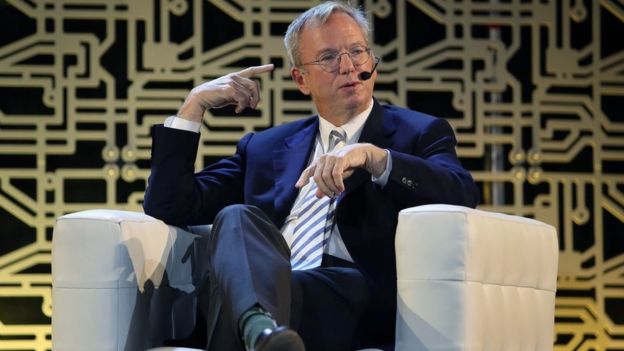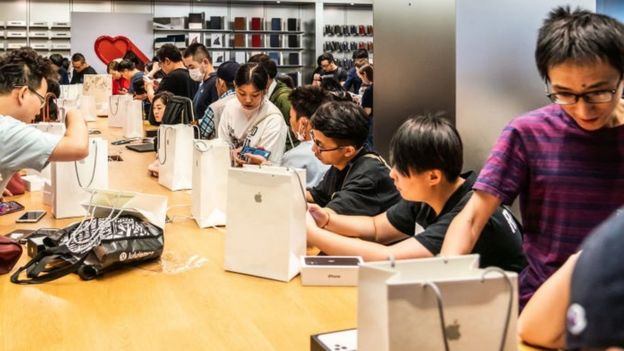 Former Google chief executive Eric Schmidt sees the internet splitting into two
Such a divide is already in place, due to the Great Firewall of China, a government-sponsored programme that censors content within its digital borders. Chinese users can't access Facebook, Twitter, Dropbox or Pinterest, among other popular sites.
They also can't read online information on the Tiananmen Square massacre or criticism aimed at President Xi Jinping. Even online images of Winnie the Pooh have been banned in China after protesters compared President Xi's face to the classic Disney character.
"In one of the biggest markets in the world, tech companies are leaving because they can't fully operate how they want to, by freely sharing information online," notes Ms Seo.
Such censorship means overseas businesses are hampered if they want to expand into China - one of the most attractive markets in the world.
No matter the size of the company, to operate in China overseas firms have to jump through hoops that can cause them problems.
While Apple services and products are available in China, the California-based tech giant has sparked controversy over its activities in the Chinese market. In 2017, China asked Apple to remove the New York Times and Skype app from its App Store. Apple complied.
Google has also waded into Chinese waters, only to be met with intense criticism. Most notably, Google secretly worked on a version of its search engine to go up against Chinese-born Baidu.
The Chinese-only Google would censor some results relating to human rights violations and controversial laws. "Project Dragonfly" was uncovered in a 2018 article by The Intercept, and Google eventually scrapped the project.
"When you enter search terms in China on their search engine, you get a different result from what you see in the West," says Sarah Cook, senior China research analyst at Freedom House, a US independent watchdog focusing on human rights. "The red lines of what is being censored are constantly moving."
2019 marks the fourth year in a row that Freedom House has ranked China at the bottom for Internet freedom in its annual report "Freedom on the Net".
Former Google chief executive Eric Schmidt sees the internet splitting into two
Such a divide is already in place, due to the Great Firewall of China, a government-sponsored programme that censors content within its digital borders. Chinese users can't access Facebook, Twitter, Dropbox or Pinterest, among other popular sites.
They also can't read online information on the Tiananmen Square massacre or criticism aimed at President Xi Jinping. Even online images of Winnie the Pooh have been banned in China after protesters compared President Xi's face to the classic Disney character.
"In one of the biggest markets in the world, tech companies are leaving because they can't fully operate how they want to, by freely sharing information online," notes Ms Seo.
Such censorship means overseas businesses are hampered if they want to expand into China - one of the most attractive markets in the world.
No matter the size of the company, to operate in China overseas firms have to jump through hoops that can cause them problems.
While Apple services and products are available in China, the California-based tech giant has sparked controversy over its activities in the Chinese market. In 2017, China asked Apple to remove the New York Times and Skype app from its App Store. Apple complied.
Google has also waded into Chinese waters, only to be met with intense criticism. Most notably, Google secretly worked on a version of its search engine to go up against Chinese-born Baidu.
The Chinese-only Google would censor some results relating to human rights violations and controversial laws. "Project Dragonfly" was uncovered in a 2018 article by The Intercept, and Google eventually scrapped the project.
"When you enter search terms in China on their search engine, you get a different result from what you see in the West," says Sarah Cook, senior China research analyst at Freedom House, a US independent watchdog focusing on human rights. "The red lines of what is being censored are constantly moving."
2019 marks the fourth year in a row that Freedom House has ranked China at the bottom for Internet freedom in its annual report "Freedom on the Net".
 Renren Yang hopes that one day the Great Firewall will come down
A business looking to enter China has to either play by the rules or leave. For example, LinkedIn doesn't allow Chinese users to access politically sensitive profiles or posts from people outside the country.
Why such restrictions on a tool specifically designed to open up digital realms of information, media and debate?
"That censorship relates to the legitimacy of the Chinese Community Party and promoting an official narrative about the nation-state," says Renren Yang, an assistant professor of modern Chinese popular culture at the University of British Columbia.
While Chinese internet users can't use Google and WhatsApp, they have Chinese equivalents, Baidu and WeChat.
Meanwhile, Amazon shut down its online store in China earlier this year in the face of poor sales trying to compete against Alibaba.
Renren Yang hopes that one day the Great Firewall will come down
A business looking to enter China has to either play by the rules or leave. For example, LinkedIn doesn't allow Chinese users to access politically sensitive profiles or posts from people outside the country.
Why such restrictions on a tool specifically designed to open up digital realms of information, media and debate?
"That censorship relates to the legitimacy of the Chinese Community Party and promoting an official narrative about the nation-state," says Renren Yang, an assistant professor of modern Chinese popular culture at the University of British Columbia.
While Chinese internet users can't use Google and WhatsApp, they have Chinese equivalents, Baidu and WeChat.
Meanwhile, Amazon shut down its online store in China earlier this year in the face of poor sales trying to compete against Alibaba.
 Operating in the Chinese market has not been straightforward for Apple
Isn't China already crafting its own parallel internet?
"An isolated Chinese internet is cut off from the rest of the world," says Ms Cook. "And what is worrying is that other countries are copying what China is doing by blocking access to certain sites or slowing down net service during protests or rallies."
Prof Yang says it would only benefit China to usher in more Western companies seeking to bring its services to the country. "For example, competition with Chinese local telecom companies will spawn the invention of new technologies and new services that people can afford and utilize. Competition brings forth innovation."
Prof Seo isn't optimistic China will change its online tune anytime soon. "Since China has replaced Western media with their own apps and sites, they don't really need western tech companies."
Other experts are hopeful that a splintering of the Internet won't be permanent.
Prof Yang says: "One day, I'd like to see the Great Firewall come down, just like the Berlin Wall did."
Operating in the Chinese market has not been straightforward for Apple
Isn't China already crafting its own parallel internet?
"An isolated Chinese internet is cut off from the rest of the world," says Ms Cook. "And what is worrying is that other countries are copying what China is doing by blocking access to certain sites or slowing down net service during protests or rallies."
Prof Yang says it would only benefit China to usher in more Western companies seeking to bring its services to the country. "For example, competition with Chinese local telecom companies will spawn the invention of new technologies and new services that people can afford and utilize. Competition brings forth innovation."
Prof Seo isn't optimistic China will change its online tune anytime soon. "Since China has replaced Western media with their own apps and sites, they don't really need western tech companies."
Other experts are hopeful that a splintering of the Internet won't be permanent.
Prof Yang says: "One day, I'd like to see the Great Firewall come down, just like the Berlin Wall did."
DISCLAIMER: The Views, Comments, Opinions, Contributions and Statements made by Readers and Contributors on this platform do not necessarily represent the views or policy of Multimedia Group Limited.
Latest Stories
-
I have been paid with malt drink and meat pie after performing – Kofi Sarpong
13 mins -
Cedi to bounce back to appreciating trajectory soon – Fitch Solutions
45 mins -
Dumsor: Finance ministry failed to pay power generators over GH₵1.2 billion under the CWM – PURC report
45 mins -
Toddler mauled by dog undergoes successful plastic surgery
58 mins -
Pepsodent champions with #TalkToADentist initiative at World Oral Health Day 2024
1 hour -
Otumfuo holds mega food fair for queen mothers
1 hour -
ACEP supports ECG privatisation to make its operations efficient
1 hour -
Only the Energy Minister can authorise publication of load-shedding timetable – Osafo-Maafo
1 hour -
Joyce Bawah Mogtari: Why Naana Jane
1 hour -
CAF Confederation Cup: Dreams FC announce free gate for Zamalek second leg clash
1 hour -
Court issues arrest warrant for former MASLOC CEO Sedina Tamakloe
2 hours -
Yorktown FC to conduct talent scouting on June 1
2 hours -
Rising from the Ashes: Jonina Ladies’ remarkable turn under Joseph Osei Owusu
2 hours -
Mrs. Stella Dovlo (Nee Agbanyo)
2 hours -
aYo Ghana wins 3 laurels at Ghana Finance Focus Awards
2 hours

